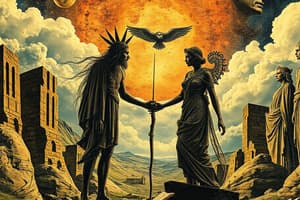Podcast
Questions and Answers
¿Cuál de las siguientes afirmaciones describe mejor a las religiones politeístas?
¿Cuál de las siguientes afirmaciones describe mejor a las religiones politeístas?
- Reconocen numerosos dioses y diosas con atributos específicos. (correct)
- Creen en un solo dios con múltiples formas.
- No tienen influencias en la vida social de sus seguidores.
- Se centran exclusivamente en el estudio de los textos sagrados.
Los mitos de creación suelen explicar el origen del universo y de la humanidad.
Los mitos de creación suelen explicar el origen del universo y de la humanidad.
True (A)
¿Qué papel desempeñaban las religiones antiguas en la vida diaria de las sociedades?
¿Qué papel desempeñaban las religiones antiguas en la vida diaria de las sociedades?
Eran fundamentales para las prácticas rituales, la organización social y la comprensión del cosmos.
En la mitología griega, el mundo fue creado a partir de _____.
En la mitología griega, el mundo fue creado a partir de _____.
Relaciona los siguientes dioses y diosas con sus dominios:
Relaciona los siguientes dioses y diosas con sus dominios:
Flashcards
Mythology
Mythology
A collection of stories from a culture, often about gods, heroes, and the origins of things.
Creation Myths
Creation Myths
Stories describing how the universe and humankind came to be.
Polytheistic Religions
Polytheistic Religions
Belief systems with many gods and goddesses.
Ancient Religions
Ancient Religions
Signup and view all the flashcards
Deities' Domains
Deities' Domains
Signup and view all the flashcards
Study Notes
Mitologia
- Mythology encompasses the body of stories belonging to a particular culture or society, often involving gods, goddesses, heroes, and supernatural beings. These narratives frequently explain the world's origins, natural phenomena, and human experiences.
Deuses e Deusas
- Polytheistic religions posit numerous gods and goddesses, each with specific domains and characteristics.
- Gods and goddesses typically embody natural forces, emotions, or abstract concepts.
- Roles and relationships between deities often vary significantly across mythologies.
- Attributes, powers, and personalities of these figures are central to the narrative and cultural understanding within specific traditions.
Mitos de Criação
- Creation myths aim to explain the origin of the universe, Earth, life, and humankind.
- They often involve divine intervention, cosmic events, or supernatural forces.
- Different cultures have unique creation myths, reflecting their beliefs and values.
- These myths are often symbolic, conveying ideas about the nature of existence and the human condition.
- Creation myths typically detail the sequence of events leading to the present state of the world and humankind's place within it.
- These narratives often highlight the importance of order, sacrifice, or struggle in the creation process.
- Example: In Greek mythology, the world was created from Chaos, through the actions of primordial deities like Gaia (Earth), Ouranos (Sky), and others.
Religião Antiga
- Ancient religions were often intertwined with the daily lives and social structures of their respective societies. They played a critical role in ritual practices, social organization, and the understanding of the cosmos.
- Myths and legends often held significant importance in shaping religious beliefs and practices.
- Rituals and ceremonies were integral parts of expressing devotion and seeking divine favor.
- Religious institutions and leaders held considerable influence within ancient communities.
- Practices and beliefs could vary drastically between different cultures and geographical regions.
- Often connected to agriculture, rituals were often synchronized with seasonal cycles and agricultural events.
- Ancient religions often served as a framework for explaining natural phenomena. Explanations often linked natural events like floods, droughts, or storms to the actions of gods.
- Common themes within ancient religions include cosmology, ethics, morality, and the relationship between humans and gods.
- Ancient religions frequently played a vital function in shaping the cultural and societal values of their time.
- Preservation of traditions through oral transmission, and later writing, helped shape and maintain the beliefs of these civilizations.
Studying That Suits You
Use AI to generate personalized quizzes and flashcards to suit your learning preferences.




